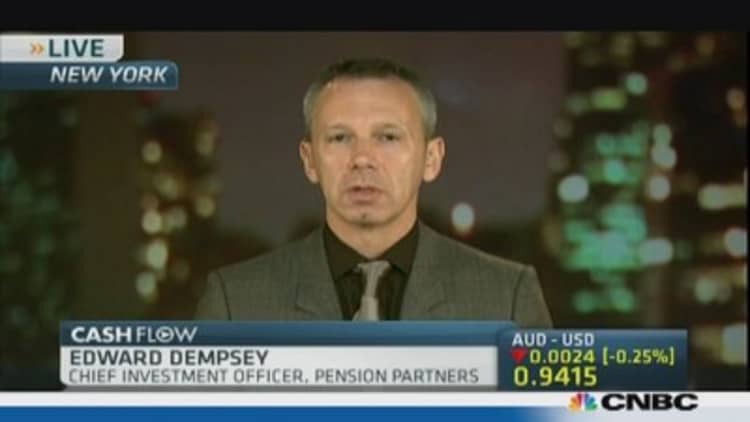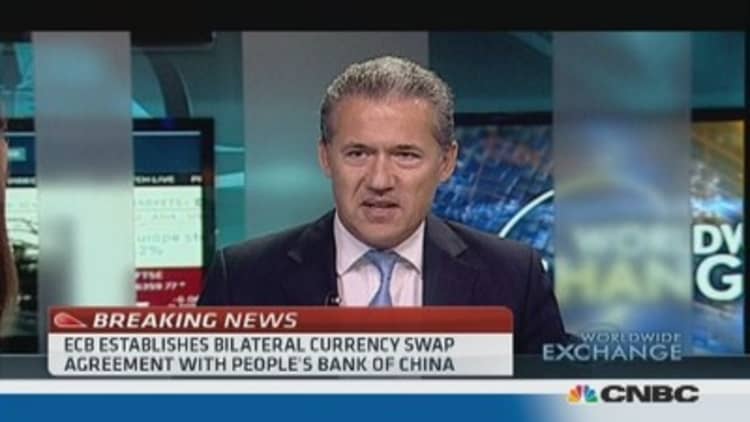In good times and bad, the world's financial system has long been able to rely on one thing: that the United States government would pay back its debt on time.
This assumption has made short-term government debt the most basic building block of the financial system, as reliable as a dollar bill.
In recent days, however, the fiscal impasse in Congress has been testing investors' confidence. As a result, investors have been shifting their money out of the $1.7 trillion market for the short-term government debt known as Treasury bills, worried, for the moment at least, that they may not be the risk-free asset they have known.
Indeed, it now costs more for the United States to borrow money for a month than it does for the average highly rated American company to do so.
"These bills are like the center of gravity for the financial universe — they really are," said Lee A. Sachs, a former Treasury official who now runs the lending firm Alliance Partners. "Defaulting on these would be like the laws of physics being repealed."
(Read more: How survivalists are preparing for a US default)
Many investors are cautious about reading too much into the recent changes in the Treasury bill market, given that it is one narrow corner of the financial world. More visible markets, like stocks, are still showing relatively little concern about a default.

But traders and bankers are watching movements in the price of Treasury bills because they could show the first tremors of a potential earthquake if Congress fails to raise the government's borrowing limit. Treasury Secretary Jacob J. Lew has said that after Oct. 17, the Treasury will no longer be able to borrow more money and may not be able to pay all of its bills.
No one is questioning yet whether the government will, at some point, pay back all the money it has borrowed. Investors are, however, entertaining doubts about whether Washington will pay back money on the date it has promised, a fundamental expectation that helps lubricate day-to-day transactions in the financial system.
"That is a very big change in perception," said Clifford D. Corso, chief executive of the trading firm Cutwater Asset Management. "So much of the world relies on that certainty of date of payment. That chain is a very large and dangerous one to monkey around with."
The clearest sign of the changing perceptions has come in the prices for the bills that the Treasury Department is supposed to repay in the days right after the debt ceiling is set to be reached.
Normally, as the day of repayment for a Treasury bill gets closer, the chances of getting repaid go up and the bill becomes worth more to investors. Now, however, the opposite is happening, and the bills are becoming worth less than they were previously, making them available for a discount on their face value.
The discount on bills to be paid on Oct. 24 has grown by 400 percent since the beginning of the month; on Wednesday, it jumped 24 percent. That has brought the price that the government has to pay to borrow money for a month to three times what the average AA-rated American company has to pay, according to Federal Reserve data. Typically, the United States government can borrow money for less than big corporations.
(Read more: Nothing to do butduck and cover if US defaults: Kyle Bass)
Confidence in investments widely considered to have little or no risk has been periodically shattered in the recent past. Until 2008, most investors thought they could not lose money on mortgage-backed bonds that carried a rating of AAA. Last year, investors were forced to rethink their belief that countries in the European Union would always repay their debt.
The trust in debt issued by the United States, however, has always run deeper because of the size of the economy and the presumed ability of the government to print as much money as it needs. This has meant that during the last two big crises, most investors sought out Treasury debt as the ultimate safe haven.
So far, despite mounting worries over the standoff in Washington, investors have not been turning away from Treasury debt altogether. They have largely remained confident that the government will pay back its longer-term debt on time, keeping the prices of those bonds stable.
But any debt set to come due in late October or November has recently become much less popular. And the concern has been stretching further into the future. On Wednesday, investors were even shunning bonds due for payment in December.
A primary way that banks and companies use Treasury bills is in managing their day-to-day needs for cash. Banks that need cash borrow against their Treasury bills overnight, in what is known as a repurchase agreement.
Mr. Corso, who helps facilitate these transactions, said that institutions making these trades have recently been refusing to accept Treasury bills due in October and November as collateral. The mutual giant Fidelity Investments is among the market participants that have said they are avoiding debt around the dates of a possible default.
But most investors say that the current issues are only a shadow of the problems that would be likely to hit if the government actually failed to pay any of its debt on time.

The Secretary General of the Organization for Economic Cooperation and Development, Angel Gurria, said on Wednesday that "putting the world's primary risk-free asset into doubt would have negative repercussions throughout the global financial system. These effects would of course feed back on the U.S. economy."
In the longer term, the fear is that a default would dent the willingness of foreign investors to use Treasury bonds as a place to park their money. Their desire to do so today has made the dollar the world's most widely used currency.
In remarks prepared for a hearing on Thursday, the head of the industry group for mutual funds, Paul Schott Stevens, said that if a payment was delayed for as little as a few days, "investors will learn a lesson that cannot and will not be unlearned."
"That lesson is simple: Treasury securities are no longer as good as cash," Mr. Schott Stevens said.
Even if members of Congress do come to a compromise before a missed payment, the current turmoil could do long-term damage to the investor confidence.
(Read more: No way US wouldallow debt default? Don't bet on it)
Andrew Mulligan, the Scottish head of global strategy at Standard Life Investments, said: "I came to the U.S. markets for certainty, but I'm not getting that."
"At the margin," he said, "people are looking for other places to keep their cash."
—By Nathaniel Popper of The New York Times

